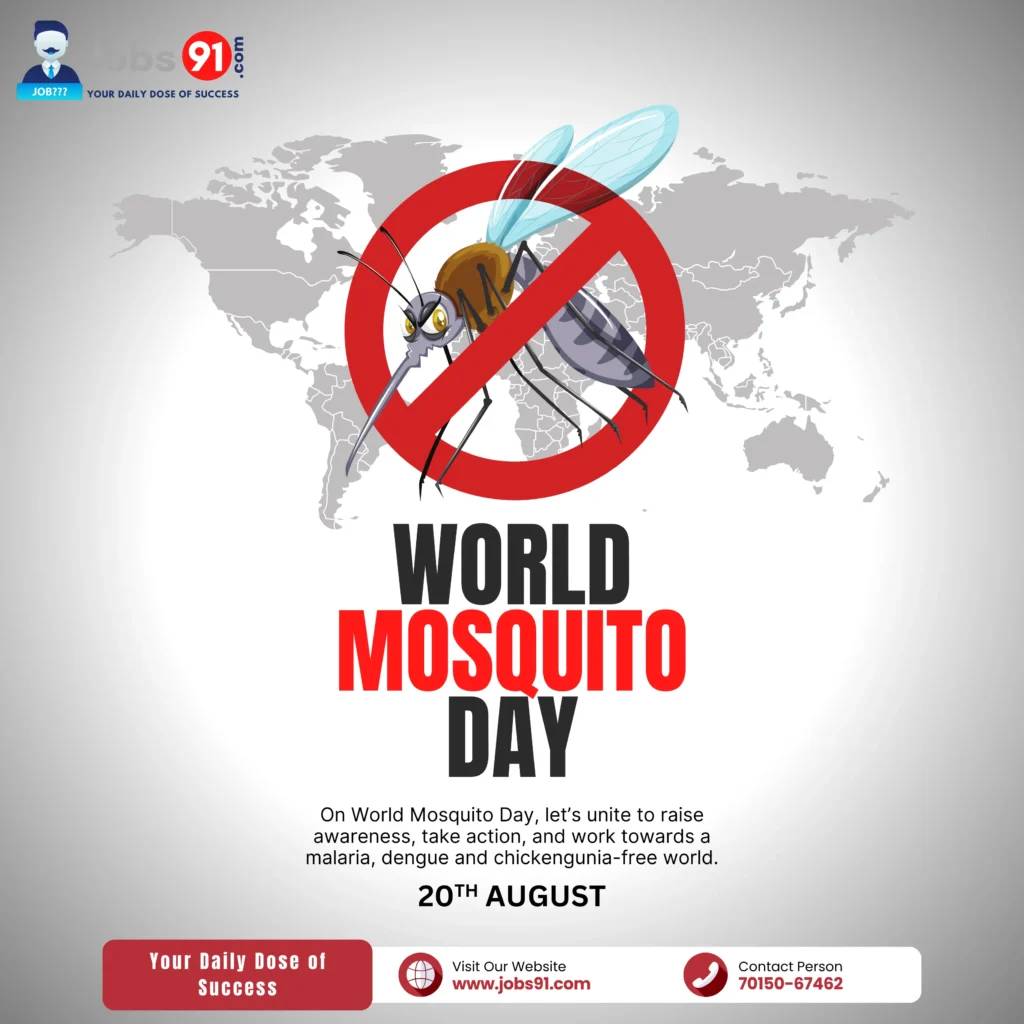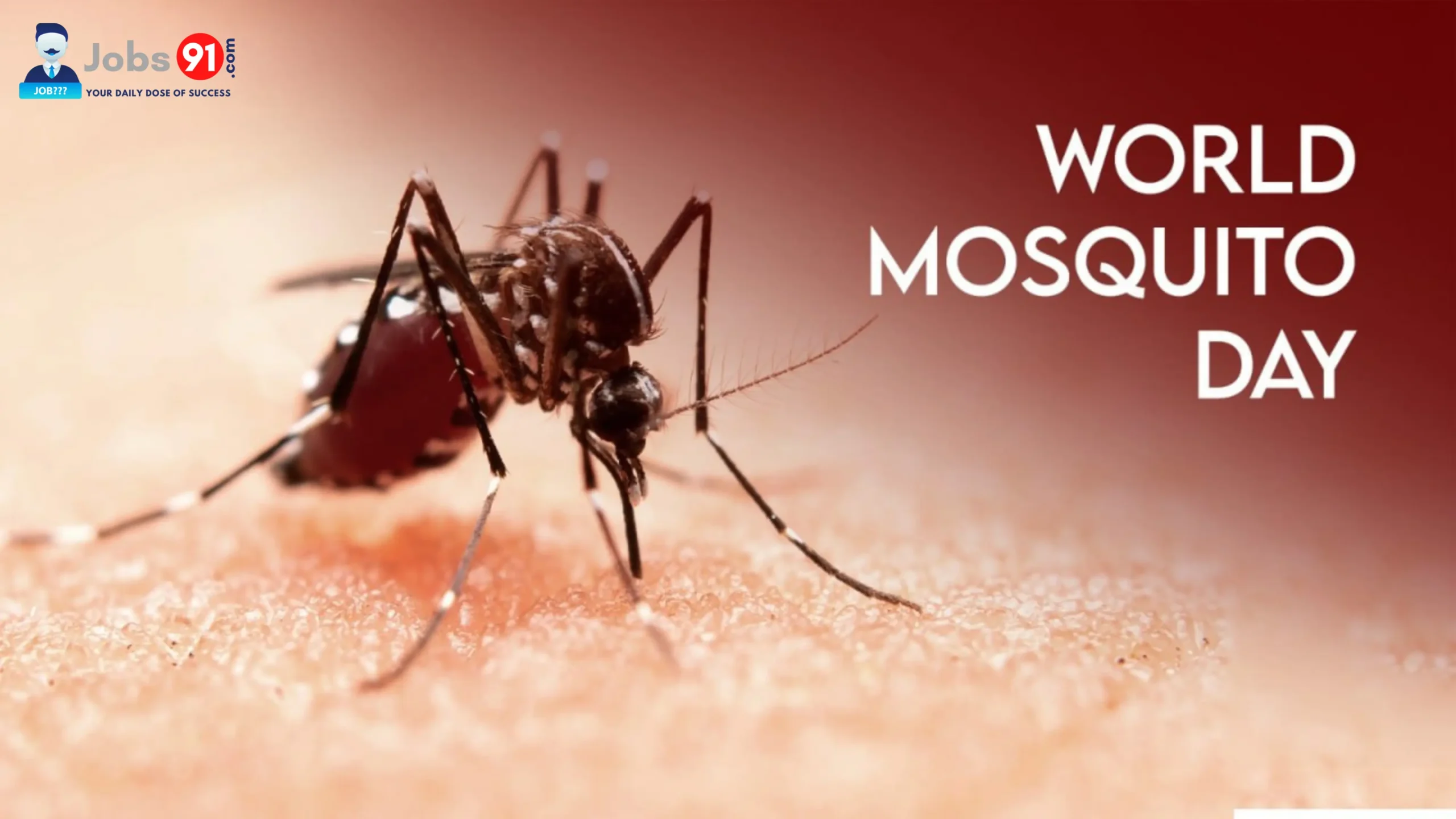World Mosquito Day 2025 is celebrated on 20 August to honor Sir Ronald Ross’s malaria discovery. Celebrate World Mosquito Day 2025 and learn about the fight against malaria and mosquito-borne diseases. Discover history, prevention tips, theme and global efforts for a more equitable world.

Table of Contents
Introduction
World Mosquito Day 2025 marks another year of global awareness against mosquito-borne diseases. Celebrated every year on 20 August, this day commemorates Sir Ronald Ross’s game-changing discovery in 1897 that female Anopheles mosquitoes transmit malaria. His groundbreaking finding later earned him the Nobel Prize in Physiology or Medicine in 1902. These include malaria, dengue, chikungunya, yellow fever, Zika virus and more, posing a serious global health threat, especially in vulnerable communities.
Historical Significance: Sir Ronald Ross and 20 August
World Mosquito Day commemorates a revolutionary scientific milestone. On August 20, 1897, British doctor Sir Ronald Ross discovered the transmission link between malaria and the female Anopheles mosquito. Before his breakthrough, malaria’s cause was a mystery, attributed mostly to “bad air”.
- 🏆 Nobel Prize: Sir Ronald Ross won the Nobel Prize in Medicine in 1902 for his discovery, fueling global efforts in mosquito control and disease prevention.
- Over the years, targeted strategies emerged: insecticide-treated nets, indoor spraying, removing breeding sites, and focused education.
🌏 World Mosquito Day 2025: Ongoing Global Battle
Mosquito-borne diseases continue to exert a heavy toll on global health:
- More than 7 lakh deaths every year, out of which over 6 lakh are caused by malaria alone.
- Diseases such as dengue, chikungunya, and Zika erupt globally, especially in areas with poor sanitation and stagnant water sources.
India’s Target: The National Vector Borne Disease Control Programme (NVBDCP) aims for a malaria-free India by 2030.
The Continuing Threat: Disease & Death Toll
Every year, mosquitoes kill over 700,000 people, with more than 600,000 of those deaths caused by malaria alone. These figures underscore the urgency of global interventions. Mosquito control is more than a health issue—it’s a matter of human survival.
India’s National Push Against Malaria
In India, the National Vector Borne Disease Control Program (NVBDCP) is on a mission to eliminate malaria by 2030. Initiatives include bed net distribution, source reduction, and community mobilization. Engaging every household in preventive action is key to reaching the elimination target.
This Year’s Theme –“Accelerating the Fight Against Malaria for a More Equitable World”।
🛡️ Prevention: How to Protect Yourself & Your Community
🏠 Mosquito Control At Home
- Remove stagnant water from containers, plant pots, gutters, and old tires.
- Use fine-mesh screens on windows and doors.
- Maintain clean surroundings, trim grass, and ensure proper drainage.
🛌 Personal Protection
- Use insecticide-treated nets (LLINs) and regular mosquito nets, especially at night.
- Apply EPA-approved repellents containing DEET, picaridin, IR3535, or lemon-eucalyptus oil.
- Wear long-sleeved shirts, pants, and light-colored clothing.
🌿 Natural Remedies
- Apply neem oil or diluted essential oils such as citronella and eucalyptus.
- Plant mosquito-repellent greens: basil, mint, lemongrass, marigold.
- Burn camphor, use garlic, tulsi, lemon-clove indoors.
👶 Special Care for Children
- Dress babies in full-sleeve clothing, use crib nets.
- Avoid chemical repellents for infants under two months; opt for barriers.
Traditional home remedies like neem, tulsi, camphor, lemon-clove, and garlic act as effective natural repellents while avoiding harmful chemicals.
Global Innovations & Youth-Led Efforts
Innovations such as the Wolbachia mosquito method reduce disease transmission sustainably—implemented in countries like Indonesia and Brazil. Youth groups in Africa are also playing key roles in vector control, awareness campaigns, and embracing advanced methods like gene drive and surveillance.
Important Links – World Mosquito Day 2025
| Resource | Link |
|---|---|
| About World Mosquito Day | Learn More |
| Global Disease Control Innovations | World Mosquito Program |
| WHO World Malaria Day Info | WHO Campaign |
| Join Jobs91.com Social Media Channels | Whatsapp | Facebook | Instagram | Telegram | Twitter |
| Subscibe to our Youtube Channel | Subscribe Now |
FAQs
Q1: When is World Mosquito Day celebrated?
It’s observed every 20 August, in honor of Sir Ronald Ross’s key malaria discovery.
Q2: What is the 2025 theme?
“Accelerating the Fight Against Malaria for a More Equitable World”.
Q3: Why is this day important?
It reminds us that mosquito-borne diseases remain deadly and highlights the need for prevention and global equity.
Q4: What simple steps help at home?
Removing stagnant water, using nets/repellents, and natural remedies like neem or camphor are effective.
Q5: Who was Sir Ronald Ross?
A physician who proved mosquitoes spread malaria in 1897 and won the 1902 Nobel Prize for the discovery.
💪 Final Thoughts & Call to Action
World Mosquito Day 2025 is an opportunity to renew our commitment to defeating malaria and other dangerous diseases. By leveraging science, supporting innovation, spreading awareness, and taking simple preventive steps, we can contribute to a healthier and more equitable world for all.
Let’s #AcceleratetheFight! Celebrate, educate, and protect your community—because every small action fights a bigger battle. 🦟🌏

